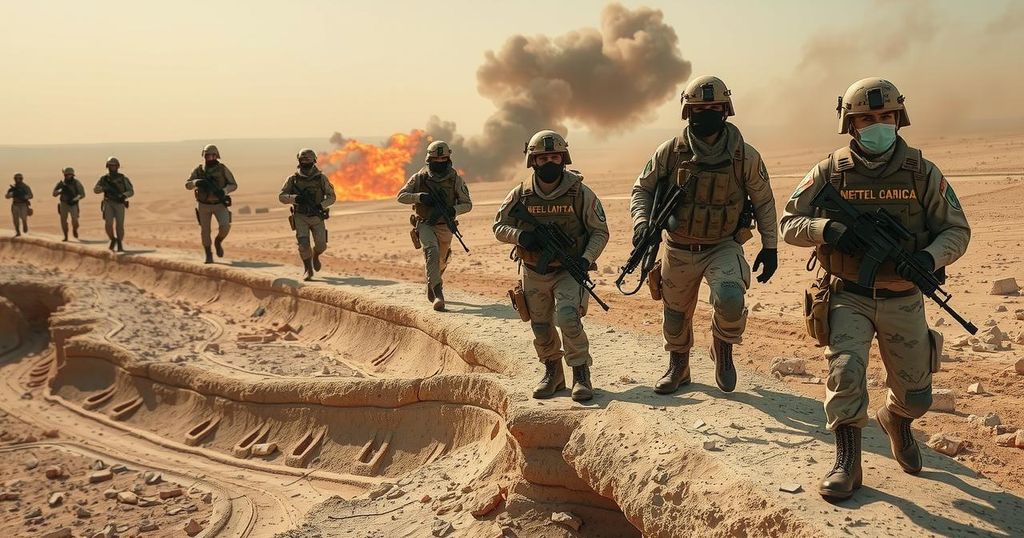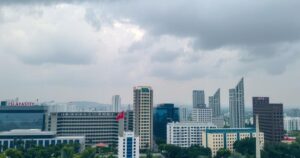Syria’s Renewed Conflict: Rebel Gains Against Assad’s Regime Amidst Turmoil

The Syrian conflict has escalated following the Hamas attacks on Israel, with rebel factions, primarily HTS, achieving significant territorial advances against President Assad’s regime. Despite these developments, serious challenges remain for both sides, with collaborative international efforts to resolve the conflict still absent, emphasizing the perilous nature of the ongoing warfare in Syria.
The resurgence of warfare in Syria marks a significant development in the evolving conflict influenced by the broader geopolitical upheaval in the Middle East. This renewed aggression can be traced to the ramifications of the Hamas attacks on Israel on October 7, 2022, which disrupted long-standing political dynamics. Over the previous decade, President Bashar al-Assad had managed to maintain his grip on power through a ruthless strategy that involved alliances with external powers such as Russia, Iran, and Hezbollah, all of whom intervened militarily to suppress various factions ranging from jihadist organizations to U.S.-backed groups.
Recent hostilities have accentuated Syria’s precarious situation as Iran faces setbacks from Israeli operations aimed at diminishing its regional influence. Hezbollah, once a crucial ally for Assad, now finds its capabilities severely diminished due to Israeli aggression, while Russia has been diverted by its engagements in Ukraine, limiting its support to Assad. Despite the waning of international media coverage and attention towards the Syrian conflict, the situation remains fraught with unresolved issues that could ignite further violence.
Assad’s regime has not returned to its previous state of dominance prior to 2011, yet it continues to cling to power over major urban areas and transport routes. In a remarkable turnaround, the coalition of rebel factions, primarily led by Hayat Tahrir al-Sham (HTS), achieved notable successes against Syrian forces, capturing key territories, including the historically fortified citadel of Aleppo. Reports from the ground indicate a surprising calm in Aleppo post-offensive, illustrated by rebel troops engaging in civilian activities.
HTS, despite its lineage to al-Qaeda, has attempted to distance itself from radical ideologies to attract broader support for its cause, renaming its current military efforts to Operation Repelling the Aggression, thereby framing the campaign as a unified revolt rather than a strictly jihadist endeavor. Despite this rebranding, HTS remains formally designated as a terrorist organization by various international bodies, complicating its legitimacy. The current offensive has arisen within Syria’s fragmented political landscape, with various groups vying for influence, including Turkish-backed militias and U.S.-supported forces.
Rebel factions have reportedly secured significant military assets, indicating a potential shift in the power dynamics toward the north. Nevertheless, the Assad regime, buoyed by its loyalist base, is likely to respond with severe retaliatory measures to regain its foothold, indicating that the cycle of violence is far from resolved. Geir Pedersen, the UN Special Envoy to Syria, underscored the inherent risks of escalating conflict, emphasizing that no military solution exists for the complexities in Syria and pointing out the failure to initiate a credible political process as outlined by UN Security Council resolution 2254.
Ultimately, while opposition forces are staging notable gains, the Assad regime retains pockets of support from constituents viewing it as a preferable alternative to extremist factions. Thus, while the regime faces formidable threats, it is premature to assume its imminent downfall; ongoing conflicts could, once again, threaten its survival.
The conflict in Syria, ignited in 2011 amid the wider Arab Spring movement, has evolved into a protracted and complex war marked by shifting alliances, power struggles, and regional interventions. The initial protests against President Bashar al-Assad’s government rapidly escalated into a full-scale civil war, attracting various domestic and international factions. The geopolitical landscape has significantly shifted following the 2022 Hamas attacks on Israel, disrupting the status quo and exacerbating the Syrian conflict as external players reassess their military strategies and involvement in the region.
In summary, Syria’s civil war remains an intricate conflict marked by recent escalations led by rebel forces against the Assad regime. While the coalition of rebels has achieved substantial territorial gains, the regime, backed by pivotal allies, is unlikely to be dismissed easily from power. The international community, represented by the United Nations, continues to wrestle with the fallout, emphasizing the need for a genuine political framework to guide a resolution to the violence. As the landscape remains volatile, both sides are likely to face renewed confrontations amidst ongoing political maneuvering.
Original Source: www.bbc.co.uk







